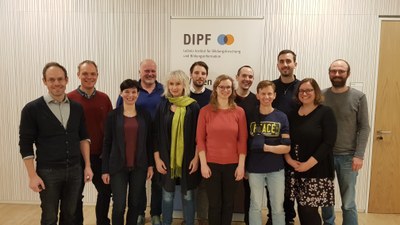DiFA - Digital Formative Assessment
The central aim is to create an online course for student teachers on the subject of digital education. From digital trace data, indicators of learning behavior will be developed and validated. These indicators will be used for learning-supporting feedback and their effectiveness will be tested.

The DiFA project aims to combine methodological perspectives from the fields of psychometrics and learning analytics to support learners through automated feedback. To this end, the project will develop an online course on "Digital Education" for student teachers, which will be available as an Open Educational Resource after the end of the project. The project is divided into two phases.
1) Pilot Phase
In the pilot phase, indicators of learning behavior will be created from trace data generated in the online course. For example, time management can be a useful indicator of commitment to learning or the learning process (e.g. the coherence of selected texts or learning steps) can be used for self-regulation. These indicators will be validated using standardized psychometric measurement methods. The indicators aim at capturing the skills and characteristics of learners that are important when using digital learning environments in higher education. To this end, the pedagogical concept and the design of the interactive learning environment must be closely coordinated. This will create the conditions for obtaining meaningful indicators of learning behavior.
2) Evaluation Phase
In the evaluation phase a second cohort of students will follow the online course. One half of this cohort will receive automated learning support feedback on their own learning behavior, based on the validated behavior indicators. The second half will serve as a control group. A pre-post measurement of the learning objectives of the course will be used to check whether the feedback has a positive effect on the learning progress of the students. Thus, the DiFA project aims to develop new forms of non-invasive measurement by using digital trace data (so-called "stealth assessment"). The results of this research are highly relevant for a better understanding of learning behavior and learning outcomes and for the automated provision of individual feedback to learners in digital environments.
Project Objective
In the DiFA project, the objective is to create an online course for student teachers on the subject of digital education. Based on digital trace data from the digital learning environment, indicators of learning behavior will be developed and validated using established measuring instruments. On the basis of the validated indicators, the learners will be given individual feedback during the learning process, which is expected to support their learning and will be tested for its effectiveness.
Funding: Leibniz-Association
Co-operation: Goethe University Frankfurt, Leibniz Institute for Educational Trajectories (LIfBi)
Duration: 02/2020 - 07/24
Status: ongoing
Project management (DIPF): Frank Goldhammer, Hendrik Drachsler
Project team (DIPF): Daniel Bengs
Contact: Daniel Bengs